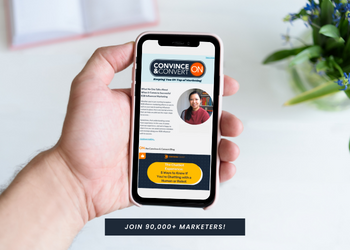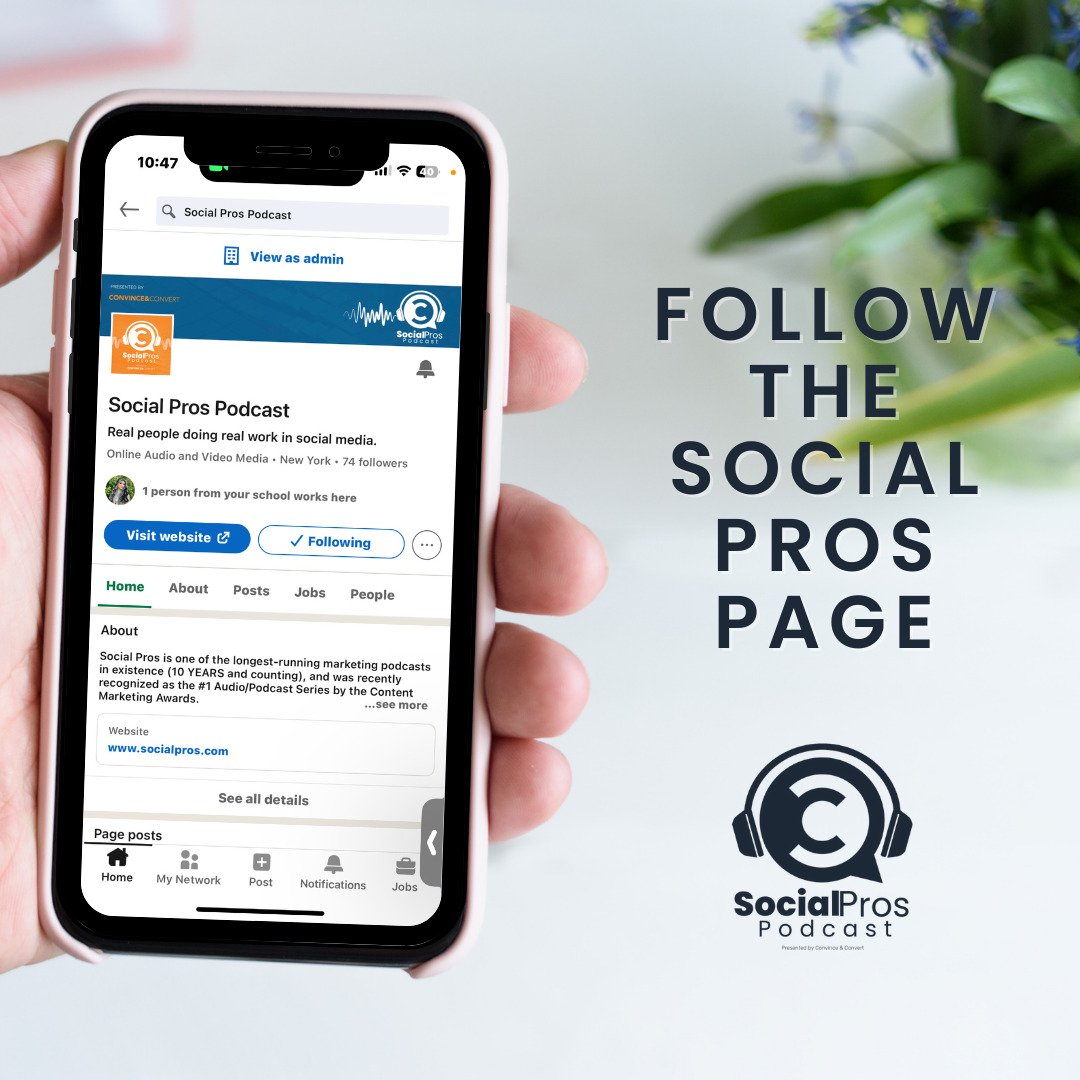![[Research] How B2B Companies are Leveraging AI](https://www.convinceandconvert.com/wp-content/uploads/2023/07/Research-How-B2B-Companies-are-Leveraging-AI.png)
Everywhere you turn, you read about AI and its impact on business. B2B marketing is at the forefront of the conversation, as professionals are planning and preparing their next steps.
New research by Wpromote and Ascend2 finds that B2B marketers are embracing AI. 79% expect to incorporate more AI into their strategies this year, looking to augment CX and customer service, content generation, and ad creative.
The research study, The 2023 State of B2B Digital Marketing, surveyed 348 B2B marketing professionals in the U.S., and was fielded in April 2023.
Here are a few of the key findings on how marketers are using AI to advance their marketing initiatives, as well as a few additional insights on the state of B2B marketing.
Finding #1: B2B marketers’ perspective on AI.
2023 is likely to go down as the year AI went fully mainstream, and B2Bs are showing no signs of being left behind when it comes to leveraging these new tools to enhance, expand, and amplify marketing initiatives.
A full 79% of B2B marketers expect to incorporate more AI into their overall strategy and tech stack in the coming year. But that seeming inevitability doesn’t mean the response to this ongoing rush to AI is completely positive.
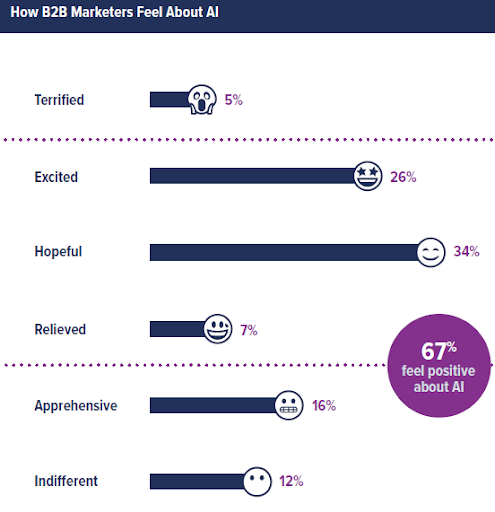
AI can be a powerful tool and B2B marketers are trying to determine where and how to get started and how to strike a balance between automation and human touch. To feel more positive about using AI, it is helpful to develop and plan to get started. Here are four steps to get started:
- Identify marketing objectives and challenges: Before incorporating AI into your B2B marketing strategy, it’s important to understand your marketing objectives and the specific challenges you face. Identify areas where AI can potentially make a significant impact, such as lead generation, personalization, customer segmentation, content creation, or predictive analytics.
- Gather and analyze data: AI relies heavily on data, so the next step is to gather and analyze relevant data from various sources. This data could include customer demographics, purchasing behavior, website analytics, social media interactions, and more. Ensure that the data is clean, organized, and stored in a format suitable for AI analysis.
- Choose the right AI tools or platforms: There are various AI tools and platforms available that can help B2B marketers implement AI in their strategies. Research and evaluate different options based on your specific needs and budget. Some popular AI tools for B2B marketers include chatbots for customer service, predictive analytics tools, natural language processing tools, and marketing automation platforms.
- Implement AI gradually: Implementing AI in your B2B marketing strategy is a process that requires careful planning and testing. Start with small-scale pilot projects to understand how AI can benefit your specific marketing objectives. For example, you could experiment with AI-powered chatbots to improve customer engagement or use predictive analytics to identify high-value leads. Gradually expand and refine your AI initiatives based on the insights and results you gather along the way.
Developing a simple plan to get started will help you feel more positive about AI and how it can help you meet specific marketing initiatives.
Finding 2: Areas B2B companies are investing in AI.
Over the next two years, marketers are considering a diverse slate of potential uses for AI, with multiple areas of opportunity relating to the customer experience, including personalization, interaction, and customer service, dominating the top 5.
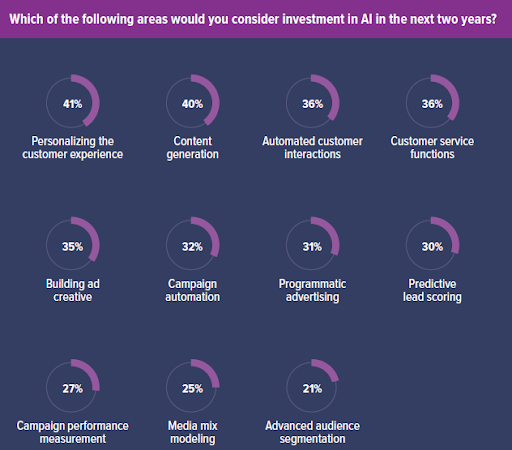
Personalizing the customer experience was #1 at 41%. So how can marketers use AI for personalizing the customer experience? Here are five ways to get started:
- Customer Segmentation: AI can help B2B marketers effectively segment their customer base by analyzing vast amounts of data. By leveraging AI algorithms, marketers can identify patterns and characteristics that differentiate customer groups.
- Predictive Analytics: AI-powered predictive analytics can assist B2B marketers in anticipating customer behavior and preferences. By analyzing historical data, AI algorithms can predict future actions, such as purchase intent or renewal likelihood.
- Dynamic Content Generation: AI can automate the process of content creation and personalization. By utilizing natural language processing (NLP) and machine learning, B2B marketers can generate dynamic content tailored to each customer.
- Chatbots and Virtual Assistants: Implementing AI-powered chatbots and virtual assistants can greatly enhance the customer experience in B2B interactions. These intelligent conversational agents can understand customer inquiries, provide instant responses, and offer personalized recommendations or solutions.
- Predictive Lead Scoring: AI can optimize the lead scoring process for B2B marketers. By analyzing historical data on successful conversions, AI algorithms can identify patterns and attributes that indicate high-quality leads.
Finding 3: Top B2B marketing challenges: CX and ROI are pain points, connecting to business outcomes is a struggle.
AI is not the only concern for B2B marketing professionals. The thorny challenge of delivering a best-in-class customer experience continues to confound many marketers, regaining the top spot on our list of challenges after dropping to third in 2022. That’s not entirely unexpected; post-pandemic, B2B buyers expect a seamless, simpler sales process akin to what they experience in B2C ecommerce.
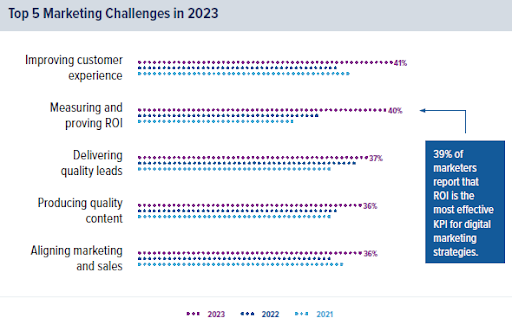
Another interesting data point is that 85% of B2B marketers struggle to connect marketing performance to business outcomes. While issues connecting marketing to business impact are close to universal among B2B marketers, top performers are doing a better job on this challenge compared to the competition. But that in and of itself gives a clue to their success: as strategies get more sophisticated, marketers are more aware of gaps in measurement and data related to the overall business because they’re actively working to solve them.
Finding 4: What are the most effective digital channels?
Organic search fell to last place in 2023, tying with streaming TV. This year, B2B marketers are paying more attention to content and paid search vs. SEO. The increased focus on accountability may have made the difficult-to-predict world of SEO less attractive. NOTE: see in the report a breakdown of channels by the top of the funnel and bottom of the funnel.
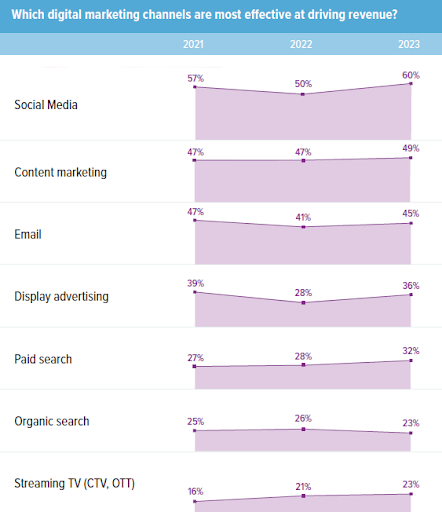
Here are three ways that B2B marketers can use content marketing and paid search to drive revenue:
- Targeted Content Promotion: Content marketing enables B2B marketers to create valuable and informative content that resonates with their target audience. To drive revenue, marketers should focus on promoting their content through paid search channels.
- Account-Based Marketing (ABM): Account-Based Marketing (ABM) is a strategic approach that focuses on targeting high-value accounts rather than individual leads. B2B marketers can combine content marketing and paid search in an ABM strategy to drive revenue. They can create personalized and highly targeted content tailored to specific accounts or industry segments.
- Remarketing and Lead Nurturing: Content marketing and paid search can be used in tandem to implement remarketing and lead nurturing strategies. Remarketing allows marketers to target individuals who have previously visited their website or engaged with their content. By using paid search ads, marketers can re-engage these prospects, reminding them of their products or services.
Final Thoughts
85% of marketers revealed that they are more focused on profitability in 2023, signaling a major shift from the classic Silicon Valley growth mindset. With this change in mindset, marketers must be agile in accessing what is working and not working, have a willingness to try new tactics like AI, and support their plans with research and data. Use the research from this report to influence your next steps. Download The 2023 State of B2B Digital Marketing to learn more.
